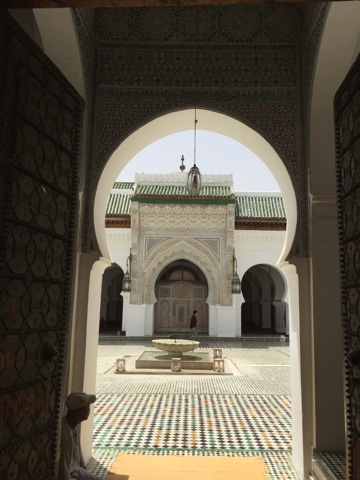Hey lovely humans! Long time no blog.
A while ago, I scrolled across a video of a conservative political commentator, Tomi Lahren, as a guest on the Daily Show (a liberal satire show). Out of curiosity, I decided to watch a lot of Tomi's videos.
I came across her video about a man who attacked many people at Ohio State University. She blamed radical Islam, ISIS, and, of course, the United States for letting "these people" into our country. I found a lot of what she said to be problematic and ignorant, but there is one thing that annoyed me more than anything else and inspired this post. She was talking about how the left was going to use this incident to talk about gun control. She said, "This has nothing to do with the weapon, nothing. This has everything to do with Allah Akbar."
This is not the first time I've encountered people misunderstanding the word "allah." Recently, in the revival of Gilmore Girls, a character says, "...so help me God... Or allah or Buddha or whatever it is you pray to."
As an avid Arabic learner and a less avid World History studier, I would like to clarify something. God is Allah. I know, I know, it's confusing. Have no fear, Corie is about to break it down for you.
Christianity, Islam, and Judaism all stem from the same religious family. Judaism, the oldest, branched off into Christianity and Islam, the youngest. In fact, there are several profits that are relevant and recognized in all three religions. The best example is the profit Abraham. He is in the old testament which means he is a recognized profit in both Christianity and Judaism. He is also a prophet in the Islamic faith. While I lived in Egypt, I celebrated Eid al-Adha. This is a Muslim holiday that celebrates Abraham’s almost-sacrifice of his son. On this holiday, some Muslims sacrifice sheep to celebrate.
The division point between Jews and Christians is Jesus. Christians believe Jesus is the son of God. Jews do not. Later, Muhammad was born. Muslims believe Jesus was a prophet, just as Muhammad is. Their jobs were to spread the word of God. The same God.
God is similar Voldemort in that he has many names. The word God is like the word water and the word blanket. In different languages, you say words differently. The word “God” is translated in and out of languages like every other word in history.
In French it’s Dieu. In Spanish, it’s Dios. In German, it’s Gott. In Arabic, it’s Allah. (Spanish and German from google translate).
If you ever hear “Allah Akhbar,” or “inshallah” or any other Arabic phrase with the word God in it (and there are many) know that it’s applicable to anyone who believes in the Abrahamic God and speaks Arabic. Yes, they are used in Islam, but Arab Christians use them too.
And to Tomi Lahren, there is no problem with “allah akhbar.” Allah akhbar isn’t even a person. It’s a sentence. Allah akhbar means “God is the greatest.” As a woman who ends every show with “God bless, and goodnight,” I think you would actually agree with the sentiments of every Muslim who says allah akhbar. I know you’re a very busy person, but it’s important to make sure the things you say make sense.
I am going to assume (and you know what happens when you assume) that you don’t speak Arabic. This is why I am willing to be forgive your faux pas. What I won't forgive is your ruthless insults to 1.6 billion people. If you’re going to condemn a terrorist, condemn the terrorist. Don't condemn over a billion people that share more beliefs with you than they do with the terrorist. That is a whole different post for a whole other time (http://abroad-outlook.blogspot.com/2015/01/islam-appreciation.html)
From California, God bless, take care, and have a very happy new year.
Learn something today.
Corie.




















































